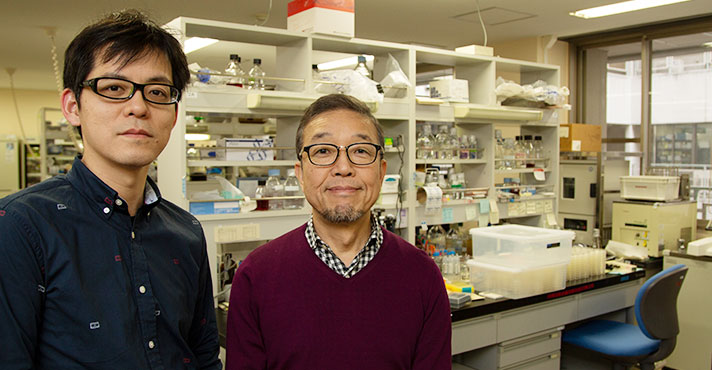
Professor Tamotsu Yoshimori, Department of Genetics, Graduate School of Medicine / Laboratory of Intracellular Membrane Dynamics, Graduate School of Frontier Biosciences
“The key to increased lifespan? Rubicon alters autophagy in animals during aging”
In 2009, a research team led by Dr. Tamotsu Yoshimori at Osaka University identified Rubicon as a protein factor that suppresses autophagy by controlling a specific step in this pathway. This time, Dr. Yoshimori and first author Dr. Shuhei Nakamura found that Rubicon expression levels increased with relation to age in worm, fly, and mouse tissues, publishing their findings, “Suppression of autophagic activity by Rubicon is a signature of aging” in Nature Communications .

What makes this research significant?
In developed countries like Japan, a super-aging society poses an increasingly serious problem. Although the mean lifespan itself in these countries was significantly extended in the past half-century, the proportion of older people relative to the total population remains high. Thus, understanding the molecular mechanism of aging and lifespan regulation and the establishment of methods to extend health span as well as lifespan based on these mechanisms are urgent tasks for our society as a whole.
Aging represents the functional deterioration of an organism. For a long time, aging was not considered a tightly regulated process. During the last 20 years, the numerous evolutionally-conserved molecular mechanisms which delay animal aging and extend lifespan have been identified using model organisms including yeast, worms, flies and mice. Notably, recent studies suggest that an evolutionally-conserved cytoplasmic degradation system, known as autophagy, is activated and is essential for all of these longevity paradigms, further attracting significant interest in the regulation of autophagy in the context of aging and lifespan regulation. In contrast, while autophagic activity is known to decrease with age in many organisms, the underlying molecular mechanisms remain unclear.
In the present study, our team showed that the expression of the negative autophagy regulator Rubicon increases with age and that its genetic ablation improves lifespan and/or ameliorates numbers of age-associated phenotypes in worm, fly and mouse models. Our results show for the first time that an increase of Rubicon is one of the causes for age-dependent impairment of autophagy and is a signature of aging. By targeting Rubicon and autophagy, we may be able to extend the health span of humans in the near future.

What is the appeal of international collaborative research?
International collaboration has recently become very common in the field of life sciences since we can utilize individual strengths from different laboratories and promote our own science very quickly, which in turn leads to breakthroughs in the field. This type of collaboration allows us to deeply connect with each other through science. It is fascinating for us to discuss and share novel findings and biological questions on a deep level. Even though we may have different cultural and social backgrounds, we can understand each other through science.
For more information:
http://www.fbs.osaka-u.ac.jp/labs/yoshimori/en/
Edit: Machiko Mawatari, Christopher Bubb